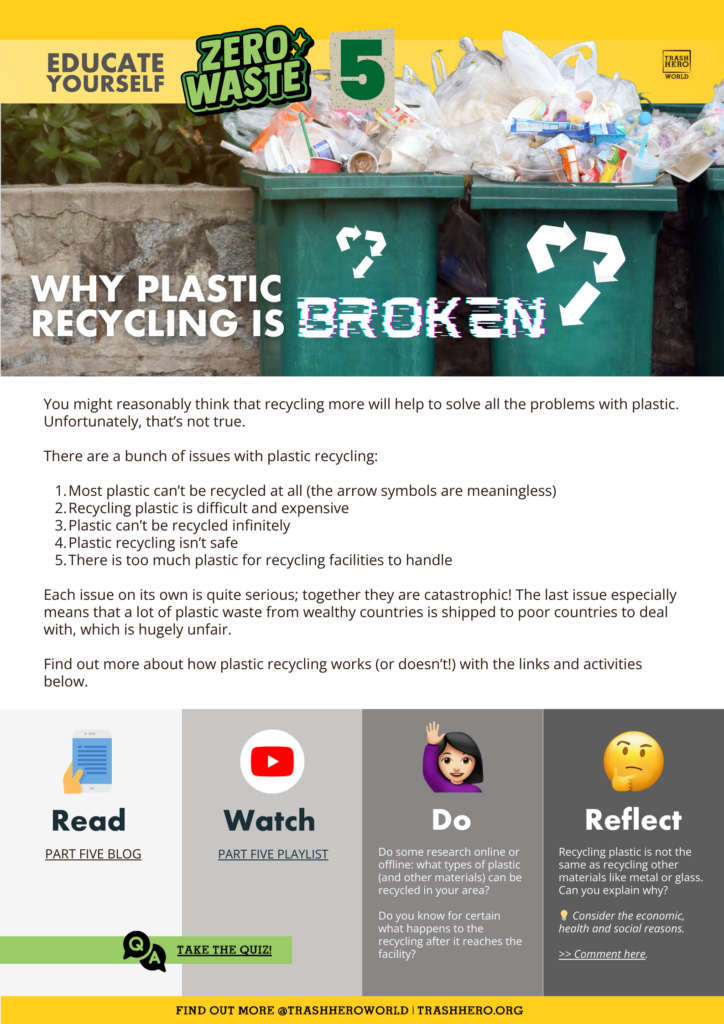Ja, du hast richtig gelesen: Mehr Recycling wird das Problem der Verschmutzung durch Plastik leider nicht lösen. Hier sind die Gründe:
In diesem Gespräch wurden viele verschiedene Punkte angesprochen. Schauen wir sie uns genauer an.
Plastik ist schwierig und teuer zu recyceln
Recycling von Plastik ist schwierig, denn es gibt Tausende von verschiedenen Arten, Farben und Zusatzstoffen – man denke nur an das durchschnittliche Supermarktregal! All die verschiedenen Plastikarten werden normalerweise zusammen gesammelt, und das Aussortieren in der Fabrik ist teuer und nicht immer effektiv. Eine ungenaue Sortierung führt zu Verunreinigungen, so dass unter Umständen eine ganze Produktionseinheit weggeworfen werden muss. Das bedeutet auch, dass recycelte Produkte von geringerer Qualität sind und neues Plastik (aus fossilen Rohstoffen) beigemischt werden muss, damit sie funktionieren. Die für die Herstellung von recyceltem Plastik erforderlichen Sortier- und Behandlungsverfahren machen den Verkauf von recyceltem Plastik teuer – es kostet in der Regel mehr als neues Plastik. Das bedeutet, dass es für Unternehmen oft nicht kosteneffizient ist, auf die Verwendung von recyceltem Plastik umzustellen.
Recycling-Pfeile sind bedeutungslos
Die kleinen Symbole mit den Pfeilen auf Plastikverpackungen geben uns vielleicht ein gutes Gefühl, aber sie sind keine Garantie dafür, dass das Plastik recycelt werden kann oder wird.

Wenn die Pfeile, die du siehst, eine Zahl enthalten, ist dies das Symbol für die jeweilige Art von Plastik, aus dem es hergestellt ist. Es gibt 6 Grundarten 1. PET (Polyethylenterephthalat)
2. HDPE (Hart-Polyethylen)
3. PVC (Polyvinylchlorid)
4. LDPE (Low-Density Polyethylene)
5. PP (Polypropylen)
6. PS (Polystyrol)
Der siebte Typ ist „Sonstige“, was „alles andere“ bedeutet – Tausende von Varianten! Nur zwei dieser Arten, nämlich die Nr. 1 (PET) und die Nr. 2 (HDPE), können tatsächlich recycelt werden, aber alle Nummern sind mit Pfeilen versehen. Wie irreführend ist das?!?
Plastik-Recycling funktioniert nicht unendlich
Im Gegensatz zu anderen Materialien wie Glas oder Metall kann Plastik nur ein- oder zweimal recycelt werden, bevor es zu sehr zerfällt, um noch nützlich zu sein. Es handelt sich also nicht um einen endlosen Kreislauf, wie wir vielleicht hoffen.

Nein, das dreht sich immer noch nicht im Kreis…
Aufgrund der spezifischen Eigenschaften von Plastik und des hohen Verunreinigungsrisikos wird es – wenn es überhaupt recycelt werden kann – in der Regel downgecycelt. In other words, it gets turned into a different kind of product from its original use. For example, plastic bottles (made from PET) are often downcycled into clothing or carpets. Plastic bags (made from LDPE) can get downcycled into waste bins or garden furniture. These new products can’t be recycled further so they eventually end up in landfill, incinerated or in nature. Around 2% of plastic is effectively recycled, which means it gets turned into something similar to its original use, so a plastic bottle to a plastic bottle. But this only adds 1 or 2 extra „loops“ to its life – after that this plastic too will degrade and get thrown away.
Recycling von Plastik ist nicht sicher
Wie wir wissen, enthält Plastik viele chemische Zusatzstoffe – manchmal die Hälfte oder sogar mehr des Gesamtgewichts des Materials. In Kunststoffen wurden etwa 16’000 verschiedene Substanzen nachgewiesen, aber über kaum eine ist etwas bekannt – geschweige denn darüber, was passiert, wenn sie im Recyclingprozess mit anderen vermischt werden.
Wissenschaftler*innen sind besorgt, weil sie gefährliche Chemikalien wie Flammschutzmittel in recycelten Kunststoff-Kochutensilien gefunden haben. Das ist problematisch, da diese direkt mit unserer Nahrung in Kontakt kommen.
Plastik zu recyceln bedeutet ausserdem, dass das Material zerkleinert, geschreddert und erhitzt wird. Dadurch sind die Arbeiter*innen einem höheren Risiko ausgesetzt, diese schädlichen Chemikalien über Hautkontakt sowie das Einatmen von Dämpfen und Mikroplastik aufzunehmen. In vielen Ländern erhalten sie weder angemessenen Schutz, um sich zu sichern, noch medizinische Versorgung, die ihnen hilft, die Folgen zu bewältigen.
Es gibt viel zu viel Plastik zum Recyceln
Vergessen wir nicht das eigentliche Problem mit Plastik: Wir produzieren es in einem alarmierenden Tempo, viel schneller, als wir es überhaupt recyceln könnten. Und meistens wollen wir es gar nicht recyceln, weil Recycling kompliziert und teuer ist. Ein Grossteil des Plastiks landet daher in ärmeren Ländern, die damit umgehen müssen. Dieser Handel wird als internationaler Müllhandel bezeichnet. Aber warum sollten diese Länder den Abfall anderer Leute überhaupt wollen? Manchmal wird ihnen dafür Geld versprochen, manchmal wird er (fälschlicherweise) als nützliche Ware deklariert.

So oder so, wenn der Abfall dort ankommt, wird er in der Regel von den Unternehmen, die das Geld dafür bekommen haben, entsorgt oder verbrannt, selbst wenn sie versprochen haben, ihn zu recyceln. Dieses ungerechte System belastet die Entwicklungsländer, die oft nicht über die nötigen Einrichtungen verfügen, um ihre eigenen Abfälle zu entsorgen, ganz zu schweigen von den Abfällen aus dem Ausland.
Zusammengefasst: Wenn wir sagen, dass das Plastikrecycling nicht funktioniert, meinen wir, dass es sowohl zu viel Plastik als auch zu viele verschiedene Arten davon gibt, um sie durch Recycling zu bewältigen. Das Material selbst ist nicht dafür ausgelegt, recycelt zu werden, weshalb das Recycling teuer, unsicher ist und die Qualität bei jedem Durchgang abnimmt. Das bedeutet, dass immer mehr neues Plastik produziert werden muss, um das alte zu ersetzen – und genau das untergräbt den Zweck des Recyclings.
Wenn du mehr über das Recycling von Plastik und seine Funktionsweise erfahren willst, schau dir schau dir die Informationen in der untenstehenden Liste mit Artikeln und Videos an. Nimm dir Zeit alles zu erkunden, was dich interessiert. Du kannst dein Wissen auch im Quiz testen. Wenn du über Plastik und dessen Recycling nachdenkst oder die Frage unten beantworten möchtest, hinterlasse uns einen Kommentar!
➤ What are the biggest problems with plastic recycling?
➤ Why the recycling symbol could end up in the trash bin
➤ What is downcycling?
➤ What’s wrong with plastic waste exports?
❗ PROBIER DAS AUS
Recherchiere online oder offline: Welche Arten von Plastik (und anderen Materialien) können in deiner Gegend recycelt werden? Weisst du, was mit dem Material passiert, nachdem es die Recyclinganlage erreicht hat?
War es einfach, diese Informationen herauszufinden? Glaubst du, dass es transparenter sein könnte?
Möchtest du dein Wissen über das Recycling von Plastik testen?
❓ DU BIST DRAN
Recycling von Plastik ist nicht dasselbe wie Recycling anderer Materialien wie Metall oder Glas. Kannst du erklären, warum?
💡 Berücksichtige die wirtschaftlichen, gesundheitlichen und sozialen Gründe.
Schreib uns deine Gedanken in die Kommentare!
Hinweis: Die Kommentare werden moderiert und erscheinen nicht sofort.



Join the conversation